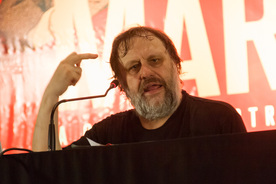by Sam Bayliss, UCLU Marxists

Slavoj Žižek, a Slovenian "Marxist" philosopher and cultural critic, spoke at UCL's European Institute on Tuesday 26th November on the subject of "What Does Europe Want?", with Srećko Horvat, a Croatian philosopher with whom Žižek recently co-authored a book of the same name. Žižek and Horvat will attempt to discuss the current problems of the European Union as they see them, namely that the EU has descended into a period of "irrationality" causing widespread outbursts of violence, both from the State and the masses, that, according to Žižek and Horvat runs contrary to the peace and security upon which the European Union is supposedly predicated.
However, what Žižek means by this "peace-project" is a form of class collaborationism in which the working masses join with the so-called "patriotic" or "progressive" bourgeoisie (the national capitalists) in order to promote a system of reform and limited redistribution that satisfies some of the workers' most basic needs while allowing the national capitalists to continue with their exploitation of these same working people. He couches this argument in the language of irrationality, diagnosing the current state of the radical left as one of "madness". Žižek, heavily influenced by the psychoanalysis of Jacques Lacan, alongside an array of other philosophers including not only Marx but the idealism of Hegel and post-war tradition of French post-structuralism, has been prone to these strictly psychological diagnoses for a long time. He imputes of the radical left "a fear of power", which he believes they disguise with their commitment to revolutionary principles. In this section of an interview in Eleftherotypia, a Greek socialist daily, his analysis is outlined “…I am fed up with the left that states that it wishes to remain loyal to its principles and dreams of radical solutions and thus always ends up being marginalized, since it isn’t actually interested in winning; maybe because if it does enter into government, its ineffectiveness will be revealed." Žižek's alternative is, as he makes clear in his role as advisor to the Greek leftist coalition SYRIZA, a slow reformism, in which a class collaborationist alliance makes breathing-room for the further development of a vague revolutionary leftism, under a system controlled by the national capitalists. Here he makes his position abundantly clear: “SYRIZA shouldn’t do some crazy leftist revolution. SYRIZA should even modernise the Greek state, make it finally an efficient, even a much better bourgeois state if you want... You will have to do the decent job that the Greek capitalist class wasn’t able to do for themselves."
However, the objective reality of the situation gives lie to Žižek's aspirations. The bourgeoisie is forced into its programme of austerity by the crisis itself. Žižek suggests that we must remain within the capitalist system for the time being. He says in a debate with Alexis Tsipras, the leader of SYRIZA, at the 6th Subversive Festival held in Zagreb earlier this year, that “It’s a question of intelligent alliances... we will still live for some decades within capitalism...". Given that Žižek believes that the expropriation of the bourgeoisie will not occur any time soon, his dreams of redistribution are simply not possible. Under capitalism, the only alternative to the neoliberal and monetarist policies pursued in the decades prior to the crisis is Keynesianism, in which the government spends money in order to promote economic growth. Keynesianism however, requires, itself, a period of economic growth to provide the money necessary for the stimuli. The only period in which Keynesianism has been implemented in Europe was in the years following the Second World War, when enormous American loans provided by the Marshall Plan and other schemes, provided a cash injection of sufficient size to allow the governments to spend money. With national debts, including American debts, in the post crisis period remaining large and ever increasing, and economic growth dwindling, stagnating or receding, the economic conditions necessary to implement Žižek's policies are simply not present.
Though Žižek himself undoubtedly has noble intentions (though he is profoundly misguided tactically) his rhetoric can only serve the interests of the national bourgeoisies across Europe. Given that the implementation of reforms is impossible, any shift to the right within leftist parties and coalitions can only aid the bourgeois in squeezing the meagre available profits out of the proletariat. Thus the real solution must be one of building the vanguard party and raising class consciousness within the proletariat in preparation for a revolution in which bourgeois property is expropriated and society is organised rationally, along the basis of need. One does hope that comrade Žižek soon realises the error of his ways.

 RSS Feed
RSS Feed